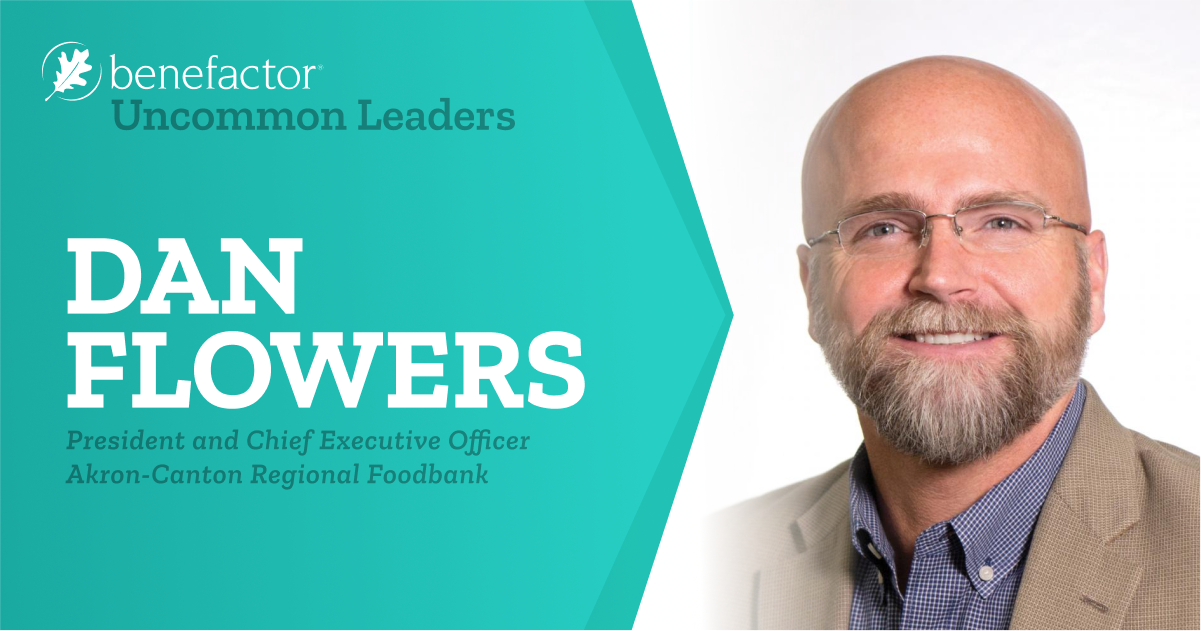Author’s Note
I first met Dan in 2018. We were working with the Akron-Canton Regional Foodbank, assessing the potential for a campaign to expand the Foodbank’s reach and increase its distribution. The campaign—Growing for Good—achieved significant success; the Foodbank opened its second campus in 2021.
On one my visits I was invited to join a staff meeting. I’ve been to my share of staff meetings. I expected the team, sitting around a large table, walking through a set agenda that included program updates, fundraising progress, shoutouts to particular staff…a nice—but standard—event. This one was different.
Dan went to the front of the room and led what felt more like a pre-game rally. There were typical updates and shoutouts, but also special guests (a local politician, a veteran) and truly engaged attendees. Dan was in equal measures a nonprofit CEO, football coach, and preacher.
Through this interview, I asked Dan to share his leadership philosophy and journey. It was a great discussion, with the highlights captured below. I hope you enjoy getting to know Dan a little. I’d also encourage you to follow him on LinkedIn. His social media game is on point.
About Dan Flowers
Dan Flowers serves as President and Chief Executive Officer of the Akron-Canton Regional Foodbank. Since taking the helm in 2003, Dan has led the organization to record levels of growth. Today, the foodbank delivers more than 30 million pounds of food each year. The organization has also been previously recognized by Feeding America as its Foodbank of the Year, the highest honor in Feeding America’s vast national network.
Dan is the former vice chair of Feeding America’s National Affiliate Council and is a past chair of the Ohio Association of Food Bank’s Board of Directors. He is a member of the Aultman Hospital Foundation Board of Directors, Better Business Bureau Akron Board of Directors, WKSU Community Advisory Council, and the Summit County Alcohol, Drug Addiction & Mental Health Services Board of Directors. Dan is a graduate of Leadership Akron Class XXII and a regular columnist for Smart Business Magazine.
Our Conversation with Dan Flowers
Tell me about your background. What led you to where you are today?
I struggled in high school academically. Looking back, I probably would have been diagnosed with some type of ADD. I always felt I was as smart as the other kids, but when I would read, it was hard to follow the words and it was hard for me to pay attention.
In college, I earned my bachelor’s degree in history and a minor in music. I worked my way through college by giving guitar lessons. At the Flint School of Performing Arts, we did this “School of Rock” thing, and we would set up bands and jam. It was really cool. Then I started coordinating a Head Start program, all while trying to figure out what my actual career could be. I enrolled in a master’s program at Central Michigan. It’s there that I learned about grants. I found a grant I could write to help the school, and that got me interested in grant writing. I applied for a grant writer job at the foodbank of Eastern Michigan in Flint. I didn’t even know what a foodbank was when they called me.
About a year in, I moved into the role of member services coordinator and started going around and setting up food pantries. I fell in love with it. I started to identify with the people I was working with. I think I made 600 agency visits in the five years I worked there. That’s when I saw the potential for a career. My decision to become a CEO was born out of a balance between how far I felt I needed to progress to achieve our family’s goals and work in a field that I loved. I started the CEO role when I was 32 and I’m almost 20 years into it. It’s been a great run.
Was there a moment when you sat back and recognized, “I’m a leader now?”
I think anybody who becomes a leader has a fair amount of ego, and it’s necessary. I always had the sense that I could do it better. Jim Collins talks about that paradoxical blend of humility and resolve that is at the core of “Level 5 leadership.” I think there’s a certain amount of resolve as in, “I’m not going to quit. I know I’ve got what it takes.” But the humility—early on as a leader—isn’t in its proper place.
When I got my first big staff and had to face some of those early challenges of leadership, having people that were more tenured than I was on my team intimidated me. I felt I was in over my head in a lot of situations. I think everyone has that first moment where you swim out into the deep water and get pulled under for the first time. I spent a lot of time underwater in those early years, and I sometimes get pulled under now but not for long. I can hold my breath longer than I used to.
It’s…love and faithfulness toward people that…defines leaders, ultimately.
It’s…love and faithfulness toward people that…defines leaders, ultimately.
What does the word “leader” mean to you? What makes a good one and what makes a bad one?
John Maxwell says, “leadership is influence,” and I’ve bought into the idea that any person with influence is leading. Underneath that, there’s a morality component, there’s a sacrificial component. That means a lot to me. I think you have to be willing to hang in there.
What I’ve also been finding is an abiding gentleness with my people. Take parenting: I think most parents of young children are like, “I don’t know how to do this.” So, you raise the child and the child teaches you how to be a parent. And you feel empowered to be a parent. No one has to explain to you how to love them or how to discipline them. But I think most people in their leadership journey early on don’t understand that they are empowered to love and care for their employees and hold them accountable. As I’ve gotten older, I’ve started to see this compatibility between being an authority figure in the environment and holding these people with love at the same time. It’s this sort of love and faithfulness toward people that I think defines leaders, ultimately.
So many decisions in leadership jobs are the lesser of two evils. Some decisions could blow up on you and end your career or at least make things really hard for a long time. So, I’ve always felt like I needed to be in a state of surrender or willingness to sacrifice my comfort, and my well-being for the job to do it right. And for your people, the way you set an example, the way you show up, I think you have to lay those things down.
How would you describe your leadership philosophy?
If I had a unified theory of leadership, it’s staying present when it’s hard and loving people as much as you can along the way. It’s essentially a human exercise. If there’s one thing that I want to be known for in my life more than anything else, it’s that I was dependable. You can count on me. That to me is the most important thing. That’s how I want to be remembered.
If I had a unified theory of leadership, it’s staying when it’s hard and loving people as much as you can along the way.
Could you give an example of how you mentor other leaders?
I think leaders go through two distinct phases. One is establishing their systems, how they lead, how they meet, how often they check in, and how they learn and do the job. And the second one is developing externally and becoming branded in that job.
I spend a lot of time with my team, trying to help them recognize where they are in that process. I spend a lot of time talking to people about management situations and how to deal with people and how to understand situations that emerge. I get calls from people who want to talk about getting to the next level in their job. It’s a matter of sitting down, talking, and figuring out what pieces are maybe missing and where they can improve.
Are leaders born or are they made?
I think they are born. Don’t send a duck to eagle school. The people that I’m looking to lead with me are the ones that are going to share this burden. They’re in it and they’re committed like I am. I just don’t think you can teach people to be that way, except maybe on the margins. Let’s say you see an employee who leaves every day at four o’clock and you tell them, “It’s good to be the last person out of the building sometimes and to show up before your people. These are behaviors that can help create a presence of leadership.” If you’re not the kind of person to take that feedback and show up and put the time in, I can’t help you.
How do you recharge your batteries?
I go through days where I’ll feel burned out and exhilarated the same day. I would say a stable routine is more important to me. I like to have regular hours that I work. I like to work hard, and I like to have two days off back-to-back. That means a lot to me. I think I’m at my best mentally and physically when I’m in a routine.
I think vacations are important and you should take them, probably more than anything, just to learn how to be still. It’s good to have some time away, but I’ll say one thing that’s true about leadership jobs: you do them in the midst of whatever else you’re experiencing in life. My dad died in 2021, and we opened our Canton building six weeks after his funeral. And it was the beginning of a mourning phase for me, and I ran this foodbank the whole time and it was so hard. I think you’re always having times of energy down, and energy up. And it’s not something you can vacation or pizza party your way out of. It’s resolve and discipline that carry you through the fluctuations of your daily life, I think.
If I were to ask your team about your leadership, what would they say?
We’re friends. I think they’d probably say that I’m silly, I’m funny, that I worry too much, that I’m transparent, I’m vulnerable. I think they’d say all those things about me. They’re not going to say all good things, but on balance, I like to think that I’ve loved them well enough that they’ve loved me back and I have every reason to think that they do.
Are there certain books or leadership gurus that you pay attention to?
I read about 40 books a year and they’re fiction. Eugene Peterson, the scholar who translated The Message: The Bible in Contemporary Language, I read somewhere that he was talking with a group of young people, and they wanted to know how often they should read the Bible. And his response was, “Most people throughout history didn’t own a Bible. It’s meant to be lived.” I think that leadership books, there are probably a dozen I could pick out that are fundamental books that everyone [theoretically] should read, but I think you’re supposed to live this journey.
I think there are a lot of neuroses that underpin the behavior of leaders. You’ve got highly egotistical people, people that worry a lot and are high strung. This notion that you need to sharpen the saw; that you don’t want to lose your edge; that you want to read the latest and greatest. This is fear-based behavior to me. A fear that you don’t have the ability to grow within the circumstances that emerge in your environment. I believe that if you’re living your leadership, and you’re thinking critically, you’re still growing. You can be reading fiction or binging shows, but you should be growing.
If you could go back in time and talk to your 20- or 25-year-old self, what advice would you give him?
He struggled a lot. I would probably give him a hug. I don’t think I’d have anything more. I think I’d just want to hug him and tell him he is going to be okay.
What is your daily routine?
It’s changed as I’ve gotten older. In 1999, I made a New Year’s resolution not to go home from work with a single paper on my desk, and I haven’t missed a day in 22 years. So, my daily routine includes being organized. I also journal every day. I listen to the daily audio Bible almost every morning. And I’ve gone for, I think it’s 27 years without going more than seven consecutive days without getting at least 30 minutes of cardio. Those are the big parts of my routine: exercising, stretching, and I’m constantly reading.
If you were to hear someone else interviewed, who would you pick?
Bill Considine, former President and CEO of Akron Children’s Hospital. To me, the best leaders have longevity in their personal relationships. Those are role models that I’m looking for to help me complete my mission, which is to stay present in my family’s life until I die. I believe that the longevity of your relationships, work and personal, is the greatest indication of your character. Those are the leaders that interest me, and Bill Considine is at the top of the list. I think he’s the best leader in town, but anyone who has those attributes, I’m interested in. They’re disciplined. And there’s an element of personal morality that I find inspiration in.





